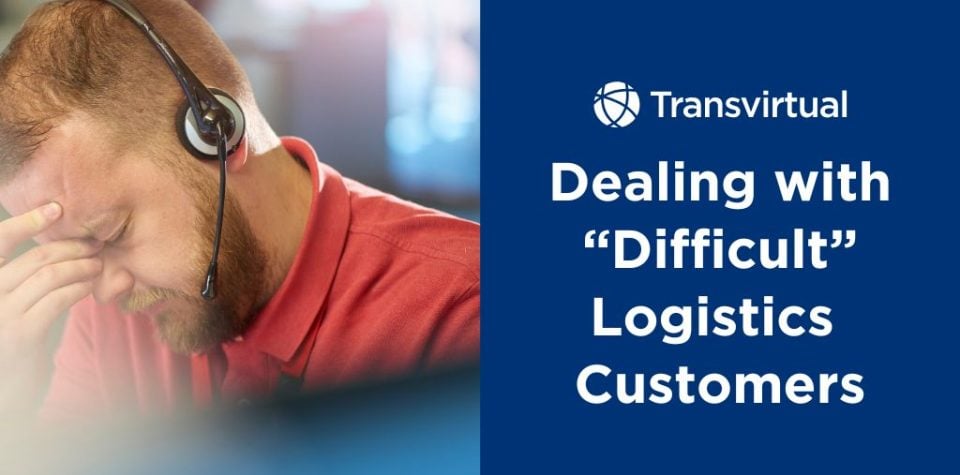Table of Contents
Every logistics team has that customer. They call three times before lunch asking where their pallet is, insist their freight was late (when we know it wasn’t), or fire off multiple emails full of caps-lock when they’re upset.
You might want to write them off as someone who’s simply impossible to please. The truth is that these types of customers aren’t always unreasonable – in fact, they might be a huge benefit to your long-term growth. Through them, you can analyse your own communication flow, visibility, and other internal processes like a canary in the coal mine.
Customer retention matters more than ever with today’s razor-thin margins, so you can’t always afford to shrug these people off. Instead of avoiding them, let them help you to understand what drives their frustration and use that insight to improve.
Understanding the Importance of Customer Service in Logistics
In the logistics industry, customer service is not just a department—it’s the backbone of your operations. Exceptional customer service is crucial for ensuring customer satisfaction and loyalty, which are key drivers of success in this competitive market. When you prioritize customer service, you’re not just solving problems; you’re building relationships that lead to increased revenue, improved customer retention, and a stellar brand reputation. On the flip side, poor customer service can spell disaster, resulting in lost business, a tarnished reputation, and operational setbacks that can be hard to recover from. Ensuring customer satisfaction should be at the forefront of your logistics management strategy.
What Makes Difficult Customers?
People don’t really get angry for no reason. If they call nonstop, they probably feel unheard, left in the dark, or like they’re the last to know when things change.
In logistics and transportation, things change a lot. Drivers get delayed, ETAs slip, receivers never get the memo. Then, it’s your customer standing in a warehouse waiting for a delivery that won’t arrive for two more hours. This impacts the overall customer experience.
That’s when they panic, ring your office, and get short with you and your team. It’s not exactly pleasant, but it’s not entirely irrational, either.
So maybe don’t use a blanket label like “difficult.” Instead, reframe them and the situation: they’re losing trust and making noise about it. We’re here to argue that the noise they make is better than silence – being loud means they still care.
Types of Difficult Customers
Navigating the logistics industry means you’ll inevitably encounter difficult customers. These can range from frequent complainers and hard-to-satisfy clients to those at risk of churning, indecisive customers, and individuals with unrealistic expectations.
Each type presents unique challenges, but understanding them is the first step toward providing excellent customer service. For instance, frequent complainers might need more frequent updates, while indecisive customers may benefit from clear, concise options. By tailoring your approach to each type, you can turn potential conflicts into opportunities for exceptional service.
Communication is Your Strongest Lifeline
No news is somehow worse than bad news. Silence lights a powder keg in this business.
Clear, timely, human customer communication is of the highest importance. Don’t just tell customers what’s going wrong – make sure they feel heard while you’re working on it. Listening actively can defuse even the most irate customers. You don’t need some script to read from or an apology that sounds like a chatbot wrote it. Just acknowledge how they feel.
Saying, “I know this is frustrating – you probably have your team waiting and no truck in sight,” is sometimes all the validation an upset customer needs to relax.
Also, leave out the logistics lingo when you don’t need to use it. Describe events in plain terms and make it all about them, not about “consignment visibility” or “reverse freight exceptions.”
Active Listening
Active listening is a cornerstone of effective customer service. It involves fully concentrating on what the customer is saying, understanding their concerns, and responding thoughtfully. This skill helps build trust, resolve issues efficiently, and provide a positive customer experience. Train your customer service representatives to use active listening techniques such as maintaining eye contact, asking clarifying questions, and paraphrasing the customer’s concerns. These practices not only defuse tension but also show your customers that you genuinely care about their issues, thereby improving overall customer satisfaction.
The Role of Customer Feedback
Customer feedback is a goldmine of insights for logistics companies looking to improve their service. By collecting and analyzing feedback, you can pinpoint areas for improvement, develop strategies to address customer concerns, and measure the effectiveness of your customer service initiatives. Feedback can be gathered through surveys, social media, and customer reviews. Use this valuable information to make data-driven decisions, enhance your customer service skills, and provide exceptional service. Remember, the goal is not just to collect feedback but to act on it, ensuring that your customers feel heard and valued.
Using Tech to Calm the Waters
The majority of what makes a customer “difficult” comes down to their not knowing what’s going on. They might not be able to see the delivery status, they’re waiting around for responses to their emails, and they feel like they’re flying blind.
With a nifty tool like a Customer Portal, those problems are over. Your customers will gain real-time tracking, PODs, and status updates without ever needing to make a call. They’ll know where their freight is, they can check delivery history, and receive their answers all within the portal.
This type of convenience creates a psychological shift to where they feel more in control. They won’t feel the need to chase you down if they already have the information they need. You’re handing them the steering wheel rather than leaving them shouting in the back seat.
Training Your Frontline Team in Customer Service Skills
Sometimes even the best tech won’t get the job done – some customers need to speak with a live person.
That’s where customer service training matters. Make sure your customer service reps and dispatchers know how to absorb customer frustration. Give them the authority and tools to put out fires before they spread.
Your team should understand both process and empathy. Use real examples in mock calls, delayed shipment drills, and other stress scenarios. Let them make judgment calls. And most importantly, train them to be calm, confident, and capable when dealing with difficult customers in logistics.
Turning Conflicts into Customer Loyalty
After spending a little time in the industry, you find that customers who complain the most can often be the most loyal. If you know how to handle their concerns, that is.
If they have a problem and you fix it quickly, treat them with respect, and follow up promptly, they’ll stick around. When you prove you can handle pressure, you’ll build trust faster than a dozen smooth transactions ever could.
And with the right tools at your disposal like a quality Customer Portal, you’ll deepen that trust even more. Your customers will feel heard, trust in your abilities, and be able to see the system work in real time. Implementing customer loyalty programs can further enhance this trust and commitment.
If you want to learn more about Transvirtual’s Customer Portal, reach out to a member of our team today.


